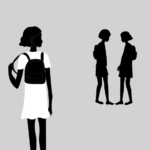WOMEN IN THE LABOR MARKET IN JANJEVA
Women in Janjeva work after working hours. They serve the family, serve agriculture, serve livestock and everything else related to taking care of things. So it’s mostly unpaid work. Commitment to housework and care makes them consequently stay left out of the workforce.
Illustration: Argjira Kukaj

Employment for women happens to be more difficult for many reasons that come mainly as a result of the patriarchal mentality. While the husband is considered the breadwinner in economic terms, the wife is seen as a housewife who has to take care of all the household chores. In Janjeva, a small and economically poor town, the position of women is twice as difficult. Women are much less likely to participate in the labour market.
Women in Janjeva work after working hours. They serve the family, serve agriculture, serve livestock and everything else related to taking care of things. So it’s mostly unpaid work. Commitment to housework and care makes them consequently stay left out of the workforce.
As Janjeva is small, employment opportunities are also significantly smaller. However, even in sectors where women could be active, women are not present due to prejudice. Despite the fact that women are engaged in agriculture, we do not find them present even in the places where they could provide their own income such as selling their agricultural products in the market. How few women are present in Janjevo is best seen in Janjevo on Friday, which is a market day. Despite the fact that every Friday the market is full of traders from different towns who sell food items, clothes, etc. let alone women who we do not see as sellers but do not even go out to buy because of social norms that do not allow women to be present in public spaces that are male dominated.
While discrimination is multiple for Roma women in Janjeva.
“As soon as they see my face (employers) they say there is no job,” said Sahadete Garipi, a 45-year-old woman from the Roma community, as she described the problems she encountered while applying for a job.
Engaging women in the labour market in Janjeva is also more difficult due to lack of proper educational preparation.
“From the moment we ask for a small job to do, this is the part where the owners say that you are a girl, questioning the leadership ability of a group”, said Djellza Gashi.
She is a 29-year-old woman but has only completed primary school and at the moment she is looking for a job, employers often doubt her ability as she has only completed primary school. Although from the post-war period the education system in Janjeva has undergone numerous reforms like the whole system in Kosovo, in order to keep pace with developments in this field with European Union countries. These reforms have not always been successful and applicable to the circumstances of Kosovo. Consequently, we now face an education system that is failing to prepare the new generations for the labour market. There is no proper match between labour supply and demand.
So, the difficulties of women in Janjeva are different from those who have not managed to complete higher education due to difficult economic conditions to those who do not have the proper educational preparation for the needs of the labour market.
Given the extremely large number of inactive women in the labour market in Janjeva, it is very important to promote ways that encourage them to motivate them to be more active and actively engaged in economic life. Since women are mainly committed to caring for children and the home, it is important to have more than one public day-care Center in Janjeva. In order for the mothers who will be employed or self-employed to have the opportunity to leave their children, not to take up child rearing and housework all the time, but also to engage in the labour market. Education is also very important in order to enable the inclusion of women in the labour market. Training sessions, particularly focused on women’s market in new skills, will give inactive women new opportunities and motivation to be active or return to the job market. This will enrich them with valuable new skills which will then give them optimism and confidence, especially that sustainable employment is possible through their active engagement itself.
About the author: Gresa Zeqiri, 15 years old from Janjeva, is high school student.
This grant is supported by the ‘Civil Society programme for Albania and Kosovo’, financed by the Norwegian Ministry of Foreign Affairs and managed by Kosovar Civil Society Foundation (KCSF) in partnership with Partners Albania for Change and Development (PA). The content and recommendations do not represent the official position of the Norwegian Ministry of Foreign Affairs and Kosovar Civil Society Foundation (KCSF).


